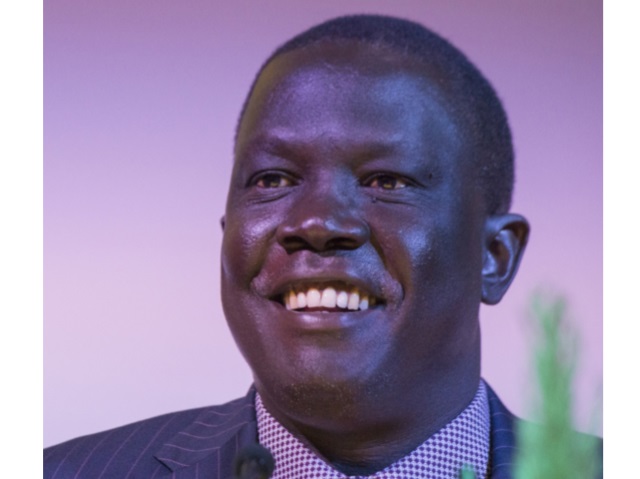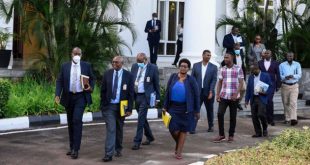
In another communiqué issued on Oct. 25 by 15 other civil society organisations based in Uganda and the DR Congo, both the Petroleum Authority of Uganda (PAU) and the National Environment Management Authority failed to comply with the law.
The two entities also refused to consult affected transboundary communities, the statement signed by Dickens Kamugisha, the executive director of the African Institute for Energy Governance (AFIEGO) noted.
The CSOs further observed that like it happened in the previous public hearings on the Tilenga and Kingfisher projects, PAU failed to consult affected local communities from the neighboring countries of DR Congo and Tanzania. AFIEGO challenged the legality of Tilenga’s public hearing and is currently in court for redress.
The 15 civil society organisations say that in organizing only three public hearings at which stakeholders from many affected districts were combined, the petroleum authority and NEMA shifted from the norm of organizing a public hearing in each of the affected districts as happened in the Tilenga and Kingfisher projects.
The organisations want NEMA to use its powers to ensure that the Petroleum Authority of Uganda complies with the 1998 EIA regulations; especially regulations 21 and 22 that require lead agencies to ensure that every public hearing is in line with the scope and nature of the project. They also want NEMA to direct the petroleum authority to organize public hearings in all the ten districts affected by the EACOP to enable the affected people to effectively participate and submit their views.
Mugyenyi says it is difficult to know if NEMA ever captures the citizens’ concerns in the report, let alone considering or incorporating them before their final decision is made.
Mugyenyi also noted that even when the conditions have been imposed and permits or certificates have been issued by NEMA, the citizens who constitute part of the group that are supposed to do the monitoring do not know what the developer is supposed to do in terms of mitigating the negative impacts of projects.
NEMA opposed on assessor
The civil society coalition on oil and gas also accused NEMA of using an environmental impact assessment practitioner (RSK Ltd) which is not duly listed on the NEMA website as required by law.
This, they say, is contrary to section 111 of the National Environment Act and regulation 16 of the National Environment (conduct and certification of environmental practitioners) regulations, 2003.
James Muhindo, the national coordinator of the Civil Society Coalition on Oil and Gas says this can be likened to using a lawyer who is not a certified advocate to represent someone in court.
Regulation 16 states that no person shall conduct an environment impact assessment on carry out any activity relating to the conduct of an environment impact study or environment audit as provided under the Act unless the person is duly registered and certified in accordance with these regulations.
The civil society organisations were also unconvinced with the issue of an interim developer undertaking the ESIA instead of the actual developer.
The report indicates that Total East Africa Midstream (TEAM) BV is an interim developer of the EACOP project and not the actual developer. The law applicable only recognizes a developer who must fully meet the responsibilities and liabilities, and not an interim developer.
Legally, when the actual developer is eventually incorporated, they will not be bound by commitments made before their incorporation, unless expressly provided and assigned in future agreements, the civil society representatives said.
“Until these legal issues are addressed, the whole process may be rendered null and void for being inconsistent with the laws of Uganda,” Muhindo said, “We believe that the concerns stated above go to the root of the process and we therefore recommend that NEMA should not approve the EACOP ESIA report until the issue of eligibility of RSK Ltd to undertake environmental impact assessment in Uganda is resolved.”
Paul Twebaze, the executive director of Pro-Biodiversity Conservationists in Uganda (PROBICOU) noted that they expect the process for selecting a reputable environmental impact assessment practitioner to be a robust one.
“We are looking at a process which was not competently handled but secondly the report coming up with generalized conclusions which underestimate the impact,” he said, “When we dug further, we realised that the company which did the study is not a registered EIA practitioner on the list provided by NEMA.”
During the public hearing, Twebaze had asked the developer to indicate the sources and volumes of water for use in hydro testing the pipeline in the report. He also cautioned against the generalizations of climate data for all the districts.
The civil society organisations noted that whereas the EACOP ESIA report identifies a number of risks or threats posed by the project, these are rated as insignificant irrespective of the magnitude of the threat.
For example, the report identifies the pipeline being in the right of way for some critically endangered and endemic plant species which are on the IUCN Red List, yet rates such impact as “not significant” and as a result the mitigation measures proposed are inadequate.
The Civil Society Coalition on Oil and Gas say they will continue highlighting the issues to both the government and the project developers because if these issues are not addressed in time, they have the potential to create unnecessary legal battles which definitely will delay the projects yet Ugandans have been waiting for this oil for a long time.
“We think that the financial resources that will come from this oil should be able to transform this country so we don’t need to do things which are likely to raise legal questions and then delay the process,” said Mugyenyi.
****
 The Independent Uganda: You get the Truth we Pay the Price
The Independent Uganda: You get the Truth we Pay the Price



We must make the planet earth a safe place to live for all species. Human race being more intelligent than the other species have the moral and legal obligation to protect the planet earth.
The proposed oil pipeline project through the center of African forest will be a human made disaster endangering human and animal lives and even the very existence millions of lives. We will have to use our tooth and nail to stop such project to take effect.
I want to show my strong protest to the proponents of this dangerous project.